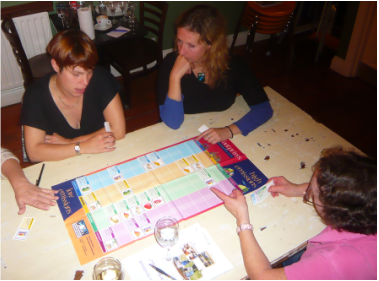
It’s a dark, damp November night, far too warm for the time of year, as we all meet upstairs at Mediterranea to consider the effects our eating habits have on our carbon footprints. It soon becomes apparent that these are complicated and highly personal, with roots embedded deeply in our upbringings, culture, health concerns and emotions...
Our next exercise is to physically place ourselves on a spectrum of worry around certain food issues: the obesity crisis - chemicals in our processed foods - animal welfare - lack of subsidies for small farmers - GMO foods - remnants of pesticides in food - food security... Some of us found ourselves huddled at the 'very worried' wall for each question, while others moved around, but no-one went into the ‘not very worried’ half of the room at all! I recommended the book “Swallow This” by Joanne Blythman, the result of the author going undercover in the shady world of processed food.
Next we play a game ranking the carbon costs involved in PRODUCTION, PROCESSING, PACKAGING and TRANSPORT for a variety of products. Breaking it down like this enables us to see how carbon gets generated at each stage and how confusing it all is. As a team we’re pretty good, getting the top five right in every category. The British beef ready meal comes out top in production and processing and pretty high in packaging, begging the question as to how it’s so cheap. Surprising results include the low production carbon cost of Californian strawberries, the high packaging carbon cost of aluminium cans, and the low packaging carbon cost of plastic! Thai chicken nuggets are the overall worst offender - no surprise there.
Food diaries are the next item on the agenda. Only one of us has filled it in but it’s illuminating nonetheless, highlighting how much processed food creeps in over a week even for a person who grows her own and cooks from scratch, and how one home cooked meal can easily come from many different countries.
Our takeaways from the session include looking at labels more carefully, reassessing our shopping habits, monitoring our processed food intake and being more aware of provenance. Our homework is to draw a time line and consider when in our lives our eating habits have changed and why - for example, when we went to Uni or after having children - to help us see that change is possible.
My takeaway is to become an even more mindful eater. What food we eat is a choice we make up to three times a day, every single day, and I want to make informed ones.
“To be interested in food but not in food production is clearly absurd.” Wendell Berry
“Eating is an agricultural act.” Wendell Berry

 RSS Feed
RSS Feed
